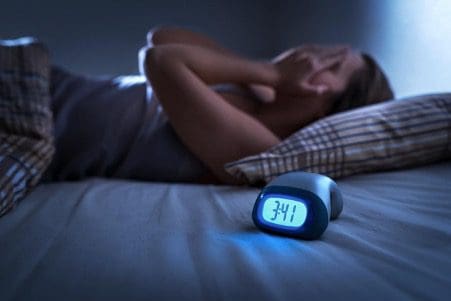While some people may have occasional trouble sleeping, others experience restless nights on a regular basis due to sleep anxiety. This condition causes people to worry about not being able to fall asleep and being sleep-deprived the following day. In addition, research suggests that half of those who suffer from sleep deprivation experience anxiety, which impacts their ability to sleep well.
Therefore, it is crucial to comprehend how anxiety affects the quality of your sleep. With that, this article explains what sleep anxiety is and its effects on sleep deprivation. It also provides science-based suggestions for decreasing anxious thoughts and setting yourself up for a good night’s rest. By implementing these tips, you may be able to reduce your sleep anxiety and improve your overall sleep quality.
An Introduction to Sleep Anxiety
Sleep anxiety refers to a form of performance anxiety that encompasses a cycle of anxious thoughts prior to bedtime, often resulting in feelings of uneasiness and worry. While the brain can keep itself occupied with a variety of tasks during the day, it can struggle to do so at night, causing anxious emotions and thoughts to surface.
On that note, anxiety and poor sleep often go hand in hand, making it difficult to determine whether you are anxious because you cannot sleep or you are unable to sleep because you are anxious. As a result, research has shown that sleep deprivation can trigger anxiety, and anxiety can lead to sleeping problems. As a result, people who experience sleep anxiety may dread heading to bed, which can exacerbate the issue by leading to more sleep deprivation.
Besides that, scientists at UC Berkeley have found that sleep deprivation can activate brain regions responsible for excessive worry, which can further increase anxiety and make it harder to fall asleep. Thus, understanding the connection between sleep and anxiety is critical for managing night-time anxiety and improving sleep quality. Moreover, by following evidence-based techniques to reduce anxious thoughts and setting yourself up for better sleep, you can take steps to alleviate sleep anxiety and improve your overall well-being.
How Are Sleep and Anxiety Correlated?
Anxiety disorders often manifest in severe sleep disturbances, such as insomnia. People who worry frequently tend to ruminate about their concerns when lying in bed, which can prevent them from falling asleep.
Insomnia is often linked to a state of mental hyperarousal characterized by worry. Individuals with anxiety disorders are more likely to experience sleep problems when under stress due to heightened sleep reactivity. Furthermore, anxiety about not being able to sleep can complicate matters, leading to sleep anxiety that reinforces a person’s sense of dread and preoccupation. These negative thoughts about going to bed can generate difficulties in maintaining healthy sleep schedules and routines and create a type of anticipatory anxiety. Having mentioned that, understanding the connection between anxiety and insomnia can help people develop effective strategies to improve their sleep quality.
What Are the Common Signs of Sleep Anxiety?
Sleep anxiety can present differently from person to person, but there are common symptoms to be aware of. These include difficulty falling and staying asleep, feelings of restlessness and nervousness, gastrointestinal problems, trouble concentrating, nightmares and night terrors, as well as twitching.
In addition to these symptoms, sleep anxiety can also trigger panic attacks, which is a sudden episode of extreme fear characterized by a feeling of impending doom, dizziness, shortness of breath, heightened heart rate, sweating, and a sense of detachment that can occur before or during sleep. After experiencing a panic attack at night, the fear of having another attack can make it harder to fall asleep, subsequently creating a vicious cycle of sleep anxiety.
Tips and Advice on You Could Overcome Sleep Anxiety
Suppose you frequently experience anxiety or disrupted sleep. In that case, there are a number of simple strategies you can use to relax your mind and body, which may help alleviate sleep anxiety over time. Nonetheless, changing your pre-sleep habits may take some time and patience, but it is always worth trying.
Try Using the Pzizz App
One of the best sleep aid apps for iPhone is the Pzizz app, which uses the latest clinical research to play “dreamscapes” – a mix of music, voiceover, and sound effects – designed to calm your mind swiftly, help you fall asleep, maintain your sleep, and wake you up feeling rested. On top of that, using headphones or earbuds is recommended for optimal effectiveness.
Develop a Proper Sleep Hygiene
Practicing good sleep hygiene refers to establishing several habits that are required for good sleep quality. Some habits include restricting screen time prior to going to bed, avoiding heavy meals or intense physical activity near bedtime, limiting consuming caffeine or alcoholic drinks, and making sure your bedroom is cool and dark. In addition, following an unswerving bedtime routine can also be helpful.
Practice Meditation
Using top meditation apps can also aid in calming anxiety before bedtime. More specifically, practicing diaphragmatic breathing relaxation techniques by spending a few minutes learning to focus on your breath, your body, or sounds can help silence your mind and calm anxiety.
Work Out Regularly
Regular exercise can help people fall asleep faster and more soundly as it lowers the production of stress hormones. Even a moderate-intensity workout, such as going for a brisk walk, might improve sleep for those with chronic insomnia. However, it is still best to avoid vigorous exercise for at least an hour before going to sleep.
Allocate Some Time for Winding Down
Creating a winding-down routine that helps you relax and prepare for sleep is important. This can include things like having a warm shower, listening to soothing music, or turning down the lights. Giving yourself at least 30 minutes to wind down and engage in small activities that help you relax can train your brain to associate these arrangements with getting ready for bedtime.
The Bottom Line
Many individuals who experience anxiety disorders often struggle with sleep, which can lead to negative effects on their mood and overall well-being. Having not enough sleep can also cause irritability and even depression because various crucial functions occur during sleep that is responsible for making one feel refreshed and mentally sharp. The good news is, addressing the underlying anxiety disorder can lead to improved sleep quality.
In addition to seeking treatment for anxiety, practicing good “sleep hygiene” can also be helpful. All in all, this includes developing habits that promote good sleep quality, such as limiting screen time before bed, staying away from heavy meals and physical activity close to bedtime, soaking up the morning sunlight, and sticking to a regular bedtime routine. Other than that, meditation, exercise, and winding down activities such as reading a book or listening to calming music via the Pzizz app can also help ease anxiety and improve sleep quality.









Leave a Reply
View Comments